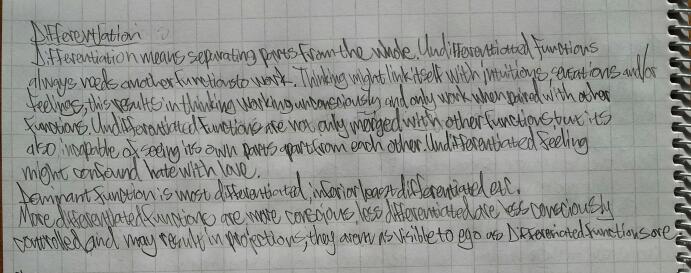redcheerio
New member
- Joined
- Jun 8, 2011
- Messages
- 912
- MBTI Type
- ENTP
- Enneagram
- E9
OK, so cognitive function theory ranks the order in which each personality type develops each of the 8 cognitive functions.
I can only remember my first 4. As an ENTP, mine are: Ne, Ti, Fe, Si.
I can agree definitely with the first 2, maybe the first 3. However, despite not being an expert, I'm going to go out on a limb and call bullshit on the theoretical development order for the rest of the functions.
Examples
For example, aren't most of us forced to develop Te in order to function in an office environment? I'm pretty sure my Te is more developed than my Si because of this. I get Te Exhaustion sometimes, but other times, I actually like using my Te. For example, I like finding efficient ways to do things. I find anal-retentive measures for supposed minor improvements to be really annoying (like bosses that get mad if you're 10 min late), but I love finding aggressive ways to improve efficiency, like systemic improvements that reduce potential for error and reduce iterations. I also like to put a lot of time into the first iteration, in order to reduce the need for subsequent iterations. It seems to work well because I sometimes feel like I'm taking way too long, yet overall I seem to work a lot more efficiently than most, with fewer iterations.
Also, I feel like I have a lot more Se than my INTJ husband. Theoretically, INTJs are supposed to have more Se than ENTPs, and I'm going to call complete bullshit on that, too. From what I've seen, ENTPs seem to have waaaaay more Se than INTJs.
I also find I've made a few major decisions in my life that seem very Fi in nature, while it is very clear to me that my Ti is like second-nature, so while I definitely prefer Ti over Fi, I do think I use Fi sometimes.
I can go on and on about why I think the theory for the development of cog functions beyond the first 2 or 3 is BS, but I'd be interested in your thoughts.
Functions - "Use" or "Prefer"? What's the Difference?
Oh yeah, and another related topic for discussion. In another thread awhile ago, I mentioned "using" certain functions, and someone said you don't "use" functions, you "prefer" them. I don't understand that, it doesn't make sense to me.
What do the rest of you think?
I can only remember my first 4. As an ENTP, mine are: Ne, Ti, Fe, Si.
I can agree definitely with the first 2, maybe the first 3. However, despite not being an expert, I'm going to go out on a limb and call bullshit on the theoretical development order for the rest of the functions.
Examples
For example, aren't most of us forced to develop Te in order to function in an office environment? I'm pretty sure my Te is more developed than my Si because of this. I get Te Exhaustion sometimes, but other times, I actually like using my Te. For example, I like finding efficient ways to do things. I find anal-retentive measures for supposed minor improvements to be really annoying (like bosses that get mad if you're 10 min late), but I love finding aggressive ways to improve efficiency, like systemic improvements that reduce potential for error and reduce iterations. I also like to put a lot of time into the first iteration, in order to reduce the need for subsequent iterations. It seems to work well because I sometimes feel like I'm taking way too long, yet overall I seem to work a lot more efficiently than most, with fewer iterations.
Also, I feel like I have a lot more Se than my INTJ husband. Theoretically, INTJs are supposed to have more Se than ENTPs, and I'm going to call complete bullshit on that, too. From what I've seen, ENTPs seem to have waaaaay more Se than INTJs.
I also find I've made a few major decisions in my life that seem very Fi in nature, while it is very clear to me that my Ti is like second-nature, so while I definitely prefer Ti over Fi, I do think I use Fi sometimes.
I can go on and on about why I think the theory for the development of cog functions beyond the first 2 or 3 is BS, but I'd be interested in your thoughts.
Functions - "Use" or "Prefer"? What's the Difference?
Oh yeah, and another related topic for discussion. In another thread awhile ago, I mentioned "using" certain functions, and someone said you don't "use" functions, you "prefer" them. I don't understand that, it doesn't make sense to me.
What do the rest of you think?


 ).
).